- Home
- J. A. Konrath
Bloody Mary Page 2
Bloody Mary Read online
Page 2
Rogers, in a move characteristic of his thoroughness, touched the tip of his tongue to the arm.
“Tastes like bleach too. Probably diluted with water, or it would have mottled the skin.”
“Get a sample to burn. And go brush your teeth.”
Rogers dug into his breast pocket for some cinnamon gum. After popping three pieces, he moved the soft blue light closer to the fingers on the right hand.
“I have a slight indentation on the index finger. Looks like she usually wore a ring.”
Hajek brushed past me, zooming in on the fingers. He snapped a close-up.
“I missed the taste test.” He playfully shoved Rogers. “Can I get one with you sucking on the fingers?”
Rogers showed him a finger of a different kind. Hajek’s shutter clicked.
“When you’re done scraping the fingernails, I need one of the fakes.”
“Finished already, Lieut.”
Rogers snapped off a pink press-on nail, bagged it, and handed it to me. Then he used a scalpel to take skin samples from each arm, putting them into glass tubes.
“Nothing on the handcuffs?”
“Wiped clean. I can take them back and fume them to make sure.”
“Do it. You’ll need these.”
I took the cuff keys from my ring, where they’d been attached for the last year. Rogers undid the handcuffs and placed them in an evidence bag. Then he brought the ALS around.
“No abrasions on the wrist.”
Hajek moved in, shooting a few frames.
“Thanks, guys,” I said. “If you can get the pictures on my desk tomorrow, along with the prints.”
“I’m on it.”
Rogers dug into his bag, removing fingerprint ink and two sets of cards. I left him to his work and went off in search of Herb.
Benedict stood in the lobby, talking to one of the attendants. Herb’s hand cradled a snack-size potato chip bag, half full. The other half was in his mouth.
He must have noticed the question on my face when I approached, because he said, “They’re fat-free.”
“Herb — it’s a morgue.”
“My Pilates instructor told me to eat small snacks several times a day to keep my metabolism up.”
He offered the bag.
“Try one. They’re baked. One-third less sodium too.”
I politely declined. “Get anything?”
“They run three eight-hour shifts, twenty-four hours. I questioned the four attendants here, and no one saw anything. Full list of employees is in my pocket.”
“Won’t help.”
The thin black man standing next to Herb offered his hand. I took it.
“And why won’t it help, Mr. . . . ?”
“Graves. Carl Graves. All them bodies come here in bags. Cops and EMTs wrap them up before dropping them off. Be real easy to put some extra parts in a bag, wheel it in, then sneak them out. No one would see a thing.”
“How many bodies are dropped off every day?”
“Depends. Sometimes, five or six. Sometimes, a few dozen.”
“Who has access to the morgue?”
“Cops, docs, morticians. Some days fifty people sign in.”
“How many employees?”
“Around twenty, with the ME’s staff.”
I frowned. If the arms had been here for a few days before being discovered, we could be dealing with several hundred suspects.
“Thanks, Mr. Graves.” I handed him my card. “If you hear anything, let us know.”
Graves nodded, walked off.
“Anything with the arms?” Herb asked, lips flecked with bits of greasy potato.
“Nothing, other than the fact that they’re my handcuffs.”
“Should I read you your rights?”
“Not yet. First you have to trick me into confessing.”
“Gotcha. So . . . was the rest of the body hard to dispose of?”
“Yeah. I’ll never get those stains out of my carpet.”
My cell rang, saving me from further interrogation.
“Daniels.”
“Ms. Daniels? This is Dr. Evan Kingsbury at St. Mary’s Hospital in Miami. Mary Streng was just admitted into the Emergency Room. You’re listed on her insurance as a contact.”
My heart dropped into my stomach.
“She’s my mother. What happened?”
“She’s sedated. I know you’re in Chicago, but is it possible for you to get here? She needs you right now.”
CHAPTER 3
I hadn’t realized how fragile my mother had become until I saw her in that hospital bed, an IV cruelly jabbed into her pale, thin arm. She couldn’t weigh more than a hundred pounds, eyes that were once bright and active now sunken and sparkless.
This couldn’t be the woman who raised me, the tough-but-loving beat cop who played both mother and father in my upbringing. The woman who taught me how to read and how to shoot. The woman with such inner strength that I modeled my life on hers.
“The doctors are overreacting, Jacqueline. I’ll be fine.” She offered a weak smile in a voice that wasn’t hers.
“Your hip is broken, Mom. You almost died.”
“Didn’t come close.”
I held her hand, feeling the fragile bones under the skin. My veneer started to crack.
“If Mr. Griffin hadn’t made the police break down your door, you’d still be lying on the bathroom floor.”
“Nonsense. I would have gotten out of there soon enough.”
“Mom . . . you were there for four days.” The horror of it stuck in my throat. I’d called her yesterday — our twice weekly call — and when she hadn’t answered, I assumed she was out with Mr. Griffin or one of the other elderly men she occasionally saw.
“I had water from the bathtub. I could have lasted another week or two.”
“Aw, Mom . . .”
The tears came. My mother patted the back of my hand with her free one.
“Oh, Jacqueline. Don’t be upset. This is what happens when you get old.”
“I should have been there.”
“Nonsense. You live a thousand miles away. This is my dumb fault for slipping in the shower.”
“I called you yesterday. When you didn’t pick up, I should have . . .”
My mother shushed me, softly.
“Sweetheart, you know you can’t play the what-if game, especially in our profession. This isn’t the first time this has happened.”
She couldn’t have hurt me more if she’d tried.
“How many times, Mom?”
“Jacqueline—”
“How many times?”
“Three or four.”
I didn’t need to hear that. “But you never hurt yourself, right?”
“I may have had a cast on my elbow for a while.”
I fought not to yell. “And you never told me?”
“I’m not your responsibility.”
“Yes . . . you are.”
She sighed, her face so sad.
“Jacqueline, when your father died, you were the only family I had left. You were also the only family that I ever needed. I would never, ever allow myself to become a burden to you.”
I sniffled, found my center.
“Well, get used to it. As soon as you’re released, you’re moving in with me.”
“Absolutely not.”
“Yes, you are.”
“No, I’m not.”
“Please, Mom.”
“No. I have a very active social life. How could I get intimate with a gentleman when my daughter is in the other room?”
Reluctantly, I played my trump card.
“I spoke with your doctors. They don’t feel that you’re able to take care of yourself.”
Mom’s face hardened.
“What? That’s ridiculous.”
“They’ll only release you from the hospital into my custody.”
“Was it that Dr. Kingsbury? Smarmy little bastard, talking to me like I’m a three-year-old.”
“You don’t have a choice, Mom.”
“I always have a choice.”
“It’s either me, or assisted living.”
I watched my words sink in. My mother’s biggest, and only, fear was going into a nursing home. Before meeting my father, she worked briefly as an activity director in a continuing care facility, and swore that she’d jump in front of a bus before ever checking into one of the “death hotels,” as she called them.
“No way in hell.”
“Mom, I can invoke power of attorney.”
“My mind is sound.”
I made myself keep going, even though I hated this.
“I have friends in the courts, Mom.”
My mom turned away, shaking her head.
“You wouldn’t do that to me.”
“Look at me, Mom. How far do you think I would go to protect you?”
Mom continued to stare at the wall. Tears streaked down her cheeks.
“Bullying an old lady. Is that how I raised you, Jacqueline?”
“No, Mom. You raised me to care. Just like you said: You’re the only family I’ve ever had. You took care of me for eighteen years.” I squeezed her hand. “It’s my turn to take care of you.”
Mom pulled her hand away.
“I’d like to be alone.”
“Please. Don’t be like this.”
She pressed the button to page the nurse.
“Mom . . . please.”
A white-clothed figure poked her head into the room.
“How are we doing, Mrs. Streng?”
“I’m very tired. I’d like to take a nap.”
The nurse looked at me, sympathetic.
I stood up, briefly fussed with the get-well flower arrangement I’d brought, and then turned to leave.
“Nurse,” Mom’s voice cracked. “Please make sure I don’t have any visitors for the next few days.”
“Perhaps you’ll feel differently tomorrow, Mrs. Streng.”
“No. I’m sure I won’t.”
The tears came again. I took a deep breath and stopped my chest from quivering.
“I love you, Mom.”
For the first time ever, she didn’t respond with “I love you too.”
The nurse put her hand on my shoulder, giving me a gentle push.
I took one more look at my mother, and walked out of her room.
CHAPTER 4
Mom lived in Dade City, a pleasant town that seemed out of place in Florida. Rather than tourist-crammed beaches and mega theme parks, Dade boasted gently rolling hills, actual woods, and so many antique malls you couldn’t spit without hitting one.
The night had arrived, hot and thick like a soggy blanket, but I kept the windows down. The rental had decent air-conditioning, but I didn’t feel I deserved it.
I’d been to her place twice before, and always missed the turn onto her street. Tonight was no exception. I pressed through three lefts and found it on the second pass.
Her condo had a matching numbered space in the parking lot. Overnight bag slung over my shoulder, her keys in my hand, I was just about to enter the lobby when I stopped, mid-step.
Was I doing the right thing?
A quick image of Mom facedown in the bathtub spurred me on.
The Highlands were retirement condos, regardless of what the brochures promised. No one under fifty-five lived here. A full-time staff kept the pool clean, ran errands for the tenants, and tended the prerequisite eighteen-hole golf course. They also had EMT training, a necessity since the elderly often acted, well, elderly. But even though they were available twenty-four hours a day, they didn’t routinely check on their residents.
I took the elevator to the fifth floor, and found a painfully thin old man in a bright Hawaiian shirt crouched before my mother’s open door, fiddling with a screwdriver.
“Hello?”
He peered at me through thick glasses; first the upper half, then tilting his head up so he could squint through the bifocals. The man had a bald head so speckled with age spots it was a dead ringer for a sparrow’s egg.
“Mmm? Oh, hello.”
The man stood, with much creaking of bones. Fully erect, he wasn’t much taller than when he’d been squatting; his back curved like a question mark. He smiled, flashing bright white dentures, and offered his hand.
“You must be Jacqueline. Sal Griffin. I’m a friend of your mother’s.”
I forced down my smile. Mom often told me stories of her trysts with Mr. Griffin, and usually described him as “insatiable,” “unrelenting,” and “He’s a machine; his pelvis is spring-loaded.” I’d always pictured him as a distinguished, Sean Connery type. Instead, standing before me was a bald Don Knotts.
“Nice to meet you, Mr. Griffin.”
“The police made a bit of a mess.” He motioned to the door. “I’m putting in a new jamb.”
“Don’t they have people here that can fix it?”
“Sure. But I wanted to make sure it was done right. Excuse me, where are my manners? Let me take that for you.”
Mr. Griffin reached for my carry-on. I thought about protesting, fearful he might hurt himself lifting it, but then let him play the gentleman. He led me into the condo, flipping on lights as he walked.
The place was clean, tidy, well-kept. I resisted the immediate urge to check the fridge and the cupboards to make sure Mom was eating right.
“I spoke with your mother a little while ago. She mentioned you might be coming.”
He set my bag down on the dining room table.
“How long ago? I’ve tried to call a few times since leaving the hospital, but she has a Do Not Disturb on the line.”
“Oh, about five minutes. She called me. I’ve never heard her so upset before.”
“We had a . . . disagreement.”
He frowned, nodding.
“Proud woman, your mother. When I had the police break in, earlier today, her first words to me were to get the hell out of her bathroom, because she didn’t want me to see her like that.”
I smirked. “That sounds like Mom.”
“I’m sorry she was there for so long. I just got back into town this morning. If I’d have even considered . . .”
“Thank you for coming to her rescue, Mr. Griffin. I’m the one who should be feeling guilty. She’s fallen before.”
“I know. Eight or nine times. I installed the safety bar in her shower.”
I tried to keep the surprise out of my voice. “Eight or nine? She told me four.”
“I’m not surprised. You’d have just . . .”
His voice trailed off. We both knew what was unsaid. If I’d known she’d been falling a lot, I’d have forced her to move in with me earlier.
“Well, I appreciate all you’ve done for her. Thank you.”
Mr. Griffin shrugged. “Beautiful woman, your mother. Nice to finally meet you. She talks about you incessantly.”
“It must be irritating.”
“Not at all. I’d love to hear your version of how you got that guy who killed all those women, the Gingerbread Man. The way your mom tells it, that private investigator fella, the one who was the hero in the TV movie, he really didn’t do a damn thing.”
“True.”
“And you’re much prettier than that fat actress they got to play you.”
“Thank you, again.”
“Though I will admit, that scene in the sewer, where you grabbed that fella’s leg and begged for him to save you . . .” Mr. Griffin chuckled. “That was pretty funny.”
I frowned. That wasn’t how it happened, but I figured I got off easy. In the original screenplay, the writer had me wet my pants in that scene. I had to threaten legal action to get that taken out.
“I’m sorry, I didn’t mean to offend you.”
“It’s fine.”
Mr. Griffin grinned. “It’s hard, having your pride trampled on.”
Then he winked at me. Clever old coot. I was about to explain the difference between havin
g a bruised ego and having a broken hip, when a beeping sound interrupted us.
“My phone. Pardon me.”
He removed a cell from his baggy shorts.
“Hello? . . . Hi, how are you feeling, Mary? . . . Yes, she’s here right now. . . . Hmm. I see. Would you like to talk to her? Perhaps you should tell her that yourself. I wouldn’t feel comfortable . . . Yes. Okay. I understand. I’ll talk to you tomorrow.”
He folded up the phone and put it away, his wrinkled face pained.
“Just tell me.”
“Your mother said that she’d prefer it if you didn’t stay at her place.”
I think I flinched.
“She’s just angry right now, Jacqueline. Angry and hurt. I’ll talk to her.”
“She was stuck on the bathroom floor, in pain, for four days—”
“I know.”
“—lying in her own mess—”
“I know.”
“She could have died, Mr. Griffin. I can’t let that happen to my mother again.”
Mr. Griffin put a hand on my shoulder, patted.
“You have to understand something about getting old, Jacqueline. We can’t hold on to our health. It’s impossible. But we try like mad to hold on to our dignity.”
My eyes teared up, but I refused to cry.
“I just want my mom to be safe. Dignity doesn’t matter.”
“But it does, Jacqueline. Once dignity is gone, the will to live isn’t far behind.”
I walked away, heading for my overnight bag.
“Fine. I’ll stay at a hotel.”
“You can, but your mother was quite clear. She refuses to speak to you until you stop bullying her. I’m sorry.”
I clenched my teeth and my fists, wanting to scream. Instead of picking up my carry-on, I walked past it and headed for the bathroom. Seeing where it happened, seeing the mess, would help steel my resolve.
The bathroom was spotless.
“I cleaned it up earlier.” Mr. Griffin put his hand on my shoulder again. “She’ll come around. Just give her time. Asking for help just isn’t your mother’s way.”
I spun, ready for a fight.
“Neither of you seem to think she needs help.”
Now it was his turn to look sad.
“Oh, she does. Yes, she does.”
“So you agree with me?”
He nodded.

 What Happened to Lori
What Happened to Lori Shot Girl
Shot Girl Street Music
Street Music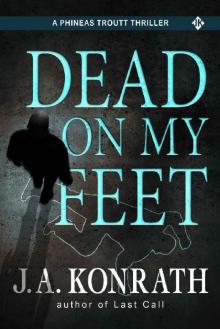 Dead on My Feet
Dead on My Feet What Happened To Lori - The Complete Epic (The Konrath Dark Thriller Collective Book 9)
What Happened To Lori - The Complete Epic (The Konrath Dark Thriller Collective Book 9) Chaser
Chaser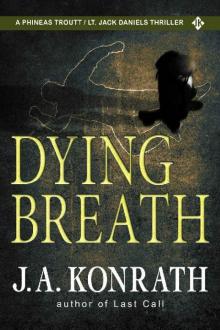 Dying Breath - A Thriller (Phineas Troutt Mysteries Book 2)
Dying Breath - A Thriller (Phineas Troutt Mysteries Book 2) Jack Daniels Six Pack
Jack Daniels Six Pack Jacked Up! (A Lt. Jack Daniels/Leah Ryan Mystery)
Jacked Up! (A Lt. Jack Daniels/Leah Ryan Mystery) Fuzzy Navel
Fuzzy Navel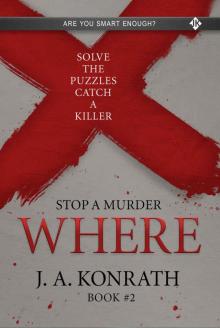 STOP A MURDER - WHERE (Mystery Puzzle Book 2)
STOP A MURDER - WHERE (Mystery Puzzle Book 2) Epitaph
Epitaph Hit: A Thriller (The Codename: Chandler)
Hit: A Thriller (The Codename: Chandler) Cheese Wrestling: A Lt. Jack Daniels/Chief Cole Clayton Thriller
Cheese Wrestling: A Lt. Jack Daniels/Chief Cole Clayton Thriller Shapeshifters Anonymous
Shapeshifters Anonymous STOP A MURDER - HOW (Mystery Puzzle Book 1)
STOP A MURDER - HOW (Mystery Puzzle Book 1) Bloody Mary
Bloody Mary Dying Breath
Dying Breath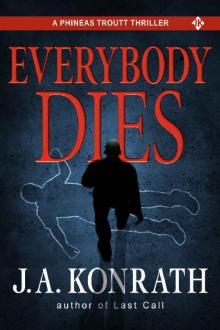 Everybody Dies - A Thriller (Phineas Troutt Mysteries Book 3)
Everybody Dies - A Thriller (Phineas Troutt Mysteries Book 3) DRACULAS (A Novel of Terror)
DRACULAS (A Novel of Terror) Shot of Tequila
Shot of Tequila Last Call - A Thriller (Jacqueline Jack Daniels Mysteries Book 10)
Last Call - A Thriller (Jacqueline Jack Daniels Mysteries Book 10) Holes in the Ground
Holes in the Ground![Shaken [JD 07] Read online](http://i1.bookreadfree.com/i1/04/01/shaken_jd_07_preview.jpg) Shaken [JD 07]
Shaken [JD 07] Flee, Spree, Three (Codename: Chandler Trilogy - Three Complete Novels)
Flee, Spree, Three (Codename: Chandler Trilogy - Three Complete Novels)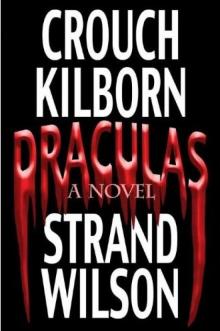 Draculas
Draculas Jack Daniels Stories
Jack Daniels Stories Wild Night is Calling
Wild Night is Calling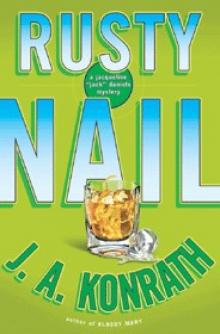 Rusty Nail
Rusty Nail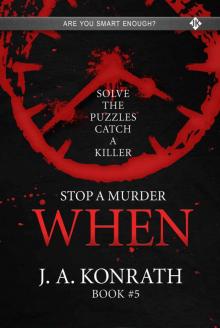 STOP A MURDER - WHEN (Mystery Puzzle Book 5)
STOP A MURDER - WHEN (Mystery Puzzle Book 5) Whiskey Sour
Whiskey Sour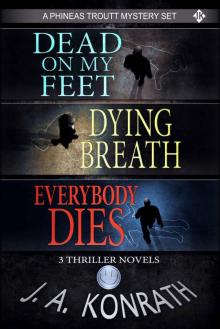 Phineas Troutt Series - Three Thriller Novels (Dead On My Feet #1, Dying Breath #2, Everybody Dies #3)
Phineas Troutt Series - Three Thriller Novels (Dead On My Feet #1, Dying Breath #2, Everybody Dies #3) Floaters - A Jack Daniels/Alex Chapa Mystery
Floaters - A Jack Daniels/Alex Chapa Mystery J.A. Konrath / Jack Kilborn Trilogy - Three Scary Thriller Novels (Origin, The List, Haunted House)
J.A. Konrath / Jack Kilborn Trilogy - Three Scary Thriller Novels (Origin, The List, Haunted House)![Shaken (Jacqueline Jack Daniels Mysteries) [Plus Bonus Content] Read online](http://i1.bookreadfree.com/i2/04/10/shaken_jacqueline_jack_daniels_mysteries_plus_bonus_content_preview.jpg) Shaken (Jacqueline Jack Daniels Mysteries) [Plus Bonus Content]
Shaken (Jacqueline Jack Daniels Mysteries) [Plus Bonus Content]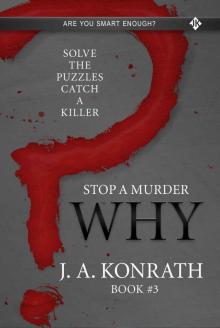 STOP A MURDER - WHY (Mystery Puzzle Book 3)
STOP A MURDER - WHY (Mystery Puzzle Book 3)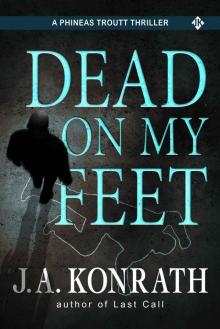 Dead On My Feet - A Thriller (Phineas Troutt Mysteries Book 1)
Dead On My Feet - A Thriller (Phineas Troutt Mysteries Book 1) Cherry Bomb
Cherry Bomb Rum Runner - A Thriller (Jacqueline Jack Daniels Mysteries Book 9)
Rum Runner - A Thriller (Jacqueline Jack Daniels Mysteries Book 9) With a Twist
With a Twist Dirty Martini
Dirty Martini Naughty
Naughty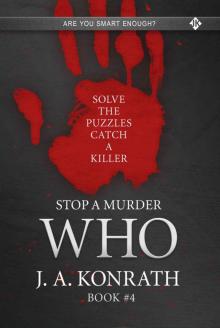 STOP A MURDER - WHO (Mystery Puzzle Book 4)
STOP A MURDER - WHO (Mystery Puzzle Book 4)